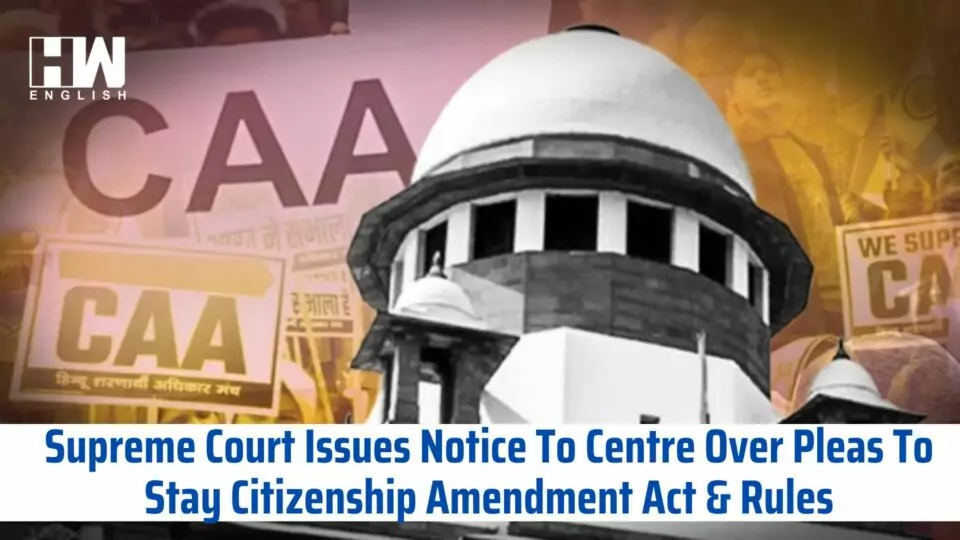The Supreme Court issued a notice on Tuesday to the Union Government regarding a series of applications seeking to halt the implementation of the Citizenship Amendment Act (CAA) and the Citizenship Amendment Rules 2024. The bench of Chief Justice DY Chandrachud and Justices JB Pardiwala and Manoj Misra has scheduled the matter for further consideration on April 9.
The hearing was adjourned following a request from Solicitor General Tushar Mehta, who sought additional time to prepare a response to the numerous petitions and applications. Mehta emphasized the case’s complexity, pointing out that there are 237 petitions and 20 applications for a stay. He argued that a thorough collation of information was necessary before filing a reply.
However, Senior Advocate Kapil Sibal objected to the extended timeline, contending that four weeks was excessive in responding to stay applications. The senior counsel argued further that the commencement of citizenship proceedings could not be reversed once initiated, suggesting that the urgency claimed by the government was unfounded. He urged the Court to consider the situation’s gravity and expedite the proceedings.
The Supreme Court hearing was scheduled following a request made by Senior Advocate Kapil Sibal on March 15. Sibal represents the Indian Union Muslim League (IUML) and other petitioners who contested the CAA in 2019.
The day after the Centre notified CAA rules, several organisations approached the Supreme Court, seeking a pause on implementing the law. Among the petitioners are political entities such as the Indian Union Muslim League (IUML) and the Democratic Youth Federation of India (DYFI), Congress leader Jairam Ramesh, Trinamool leader Mahua Moitra, and AIMIM chief Asaduddin Owaisi. These parties have raised concerns over the CAA’s discriminatory nature against the Muslim community.
As per the Centre, the amendment aims to safeguard religious minorities facing persecution in neighbouring countries. However, its exclusion of Muslims prompted challenges in the top court. On December 18, 2019, the court notified the Union of India on this matter.
According to reports, at least five applications have been filed so far by IUML, Assam Congress leader Debabrata Saikia, Asom Jatiyatabadi Yuba Chatra Parishad, Democratic Youth Federation of India, and the Social Democratic Party of India.
Previously, when the Citizenship Amendment Bill passed Parliament in 2019, petitions were filed against it, but the court didn’t intervene as the rules hadn’t been notified. Senior Advocate Kapil Sibal clarified that there was no basis for intervention at that time. However, now that the rules are in place, various parties have approached the Supreme Court seeking relief.
Under the CAA law, non-Muslim migrants from Bangladesh, Pakistan, and Afghanistan fleeing religious persecution can seek Indian citizenship. People from Hindu, Sikh, Buddhist, Jain, Parsi, or Christian communities in Afghanistan, Pakistan, and Bangladesh who entered India on or before December 31, 2014, are eligible to seek citizenship under the CAA.
Meanwhile, opposition parties have criticized the timing of the law’s implementation, accusing the ruling BJP of using it to polarize elections, especially in states like West Bengal and Assam.
Trinamool Congress chief and Bengal Chief Minister Mamata Banerjee has said she doubts the legality of CAA and alleged a conspiracy to “snatch citizenship rights”. “BJP leaders say CAA gives you rights. But the moment you apply for citizenship, you become illegal migrants. You will lose rights and be taken to detention camps. Please think before you apply,”.
The Centre has trashed the Opposition’s allegations. Stressing that the CAA is not “unconstitutional”, Home Minister Amit Shah has accused the Opposition of resorting to the “politics of lies”. He said that the BJP has a clear agenda regarding the timing of the law’s implementation. Under that promise, the Citizenship (Amendment) Bill was passed in both houses of Parliament in 2019. It got delayed due to Covid.” He has also said that minorities of the country “need not be afraid because CAA has no provision to take back the rights of any citizen”.
ALSO READ: Punjab: BJP, Akali Dal Likely To Join Hands For Lok Sabha Polls
Chief Minister Himanta Biswa Sarma said at least five lakh Bengali-speaking Hindus, two lakh indigenous Assamese, and 1.5 lakh Gorkhas were left out of the National Register of Citizens (NRC). Of these, between three and six lakh will apply for citizenship under the CAA.
Tamil Nadu Chief Minister M K Stalin on Sunday said he believed that the Citizenship (Amendment) Act is only a precursor and the BJP will bring laws in the future to target people ‘speaking different languages in each state, targeting linguistic minorities.
On the international front, Senator Ben Cardin in the US expressed concern over India’s Citizenship Amendment Act (CAA) enforcement rules, emphasizing the importance of cooperation based on shared human rights values between Washington and New Delhi. He voiced deep reservations about the potential impact of the CAA on India’s Muslim community and the fact that it is being pushed during the holy month of Ramadan.
Indian External Affairs Minister S Jaishankar rebuffed the US criticism, asserting it lacked a proper understanding of the law’s historical context. Jaishankar, speaking at the India Today Conclave, reiterated that the CAA aimed to address challenges stemming from the partition, emphasizing the significance of principles such as freedom and equality in a democracy. He questioned the global understanding of Indian history amidst the criticism.
As an independent media platform, we do not take advertisements from governments and corporate houses. It is you, our readers, who have supported us on our journey to do honest and unbiased journalism. Please contribute, so that we can continue to do the same in future.

